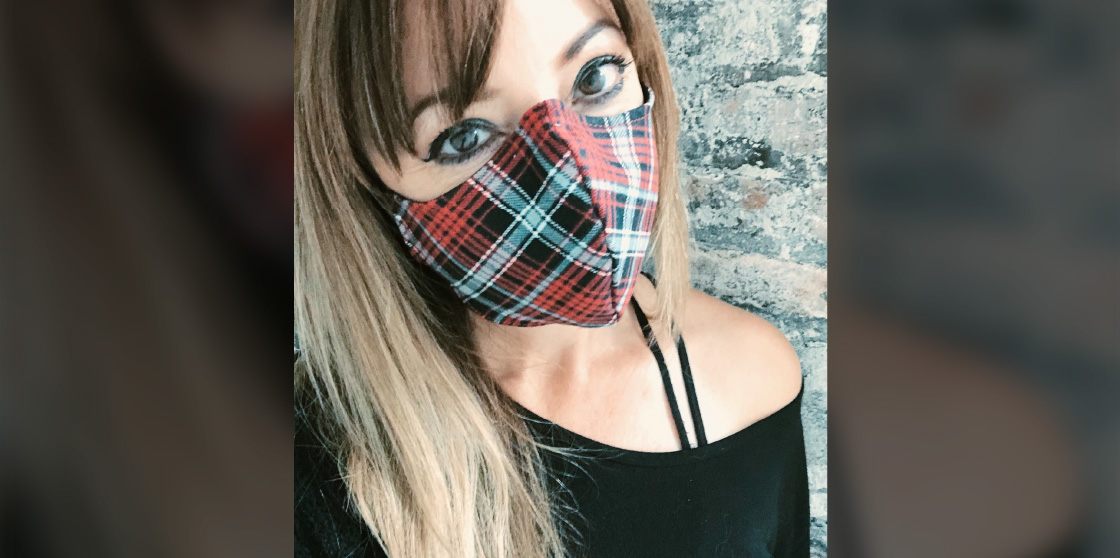

Photo Courtesy of Detroit Sewn.
Detroit Sewn and its founder, Karen Buscemi, are used to deadlines, high pressure and moving quickly. Buscemi is a former magazine editor turned entrepreneur, and she has used every bit of that work ethic and energy so help create more than 300,000 medical masks for hospitals and first responders across Metro Detroit.
They smashed that goal and then some.
“Between our factory and our factory partners all producing for our clients, we have made over 700,000 masks,” Buscemi said.
What’s equally important to Buscemi, who is known for her fashion-forward thinking and design aesthetic, is that the masks work well, are made with best practices and are sustainable. That means the Personal Protection Equipment – masks, gowns and more – than comes from Detroit Sewn is made in the United States, sourced domestically, has a tightly woven cotton base and can fit various face sizes, Buscemi said.
“Mask fit is essential. You need to have a mask that you can count on,” especially when you are working with patients, volunteering in a hospital setting or having any contact with people who may have been exposed to COVID-19, Buscemi said.
Most importantly, they have to avoid gapping between the mask and face. That means people with glasses won’t get foggy vision. Even more key is that people can avoid the air-borne particulates that can spread coronavirus, Buscemi explained. Protecting kids, adults and medical professionals alike has been a huge part of Detroit Sewn’s efforts and that will continue as mask making moves into 2021 and, perhaps, beyond that.
Buscemi, former editor of the defunct StyleLine magazine, took her years of knowledge about the fashion industry and created the nonprofit Detroit Garment Group in 2012. Her goal, in part was to help Michigan- and Midwest-based meeting designers who needed entrepreneurial help. That turned into launching a Garment District in Detroit. Next came the full-service Detroit Sewn, which creates apparel, accessories and home goods under the motto “Make. Manufacture. Matter.”
Since spring, Pontiac-based Detroit Sewn has turned its production to making masks as part of its work with the Arsenal for Health Care. It added a second shift of sewers to its staff, acquired additional sewing machines and found the resources it needed to support the high demand for masks as coronavirus cases soared.
It was an intense time, Buscemi recalled. Things have slowed somewhat, and mask making has gone back to so-called normal levels. Buscemi said some of their sewers who were there from other jobs have gone back to their original careers. But their contributions will always been remembered and appreciated not only by Detroit Sewn but also by the hundreds of professionals they helped through their hard work and sewing skills.
Making masks and gowns that can be washed and still offer protection also has been one of Buscemi’s main missions at Detroit Sewn. Nurses and other medical professionals need to change gowns frequently – often between every patient – so finding a way to offset that kind of waste and turnover of goods is part of fashion and companies overall being more sustainable and environmentally aware of their part of the world’s ecosystem, she added.
“Sustainable PPE provides such a massive benefit at this time, as you don’t have to worry about one and done wearings and inventory dropping quickly. Knowing the same isolation gown can be laundered and worn 25 or 50 times, depending on the fabric, means your PPE goes so much farther,” Buscemi said.
Buscemi also is proud of the see-through masks that Detroit Sewn produces. These masks are especially useful for kids with hearing-impaired friends or family members, special needs kids, and anyone who prefers to have their mouth and expressions seen when they speak. They are comfortable, breathable, come with adjustable elastic that goes over the head, and have no gaps.
“We’re prepared so that if this should happen again and the numbers increase, we are ready,” Buscemi said.


